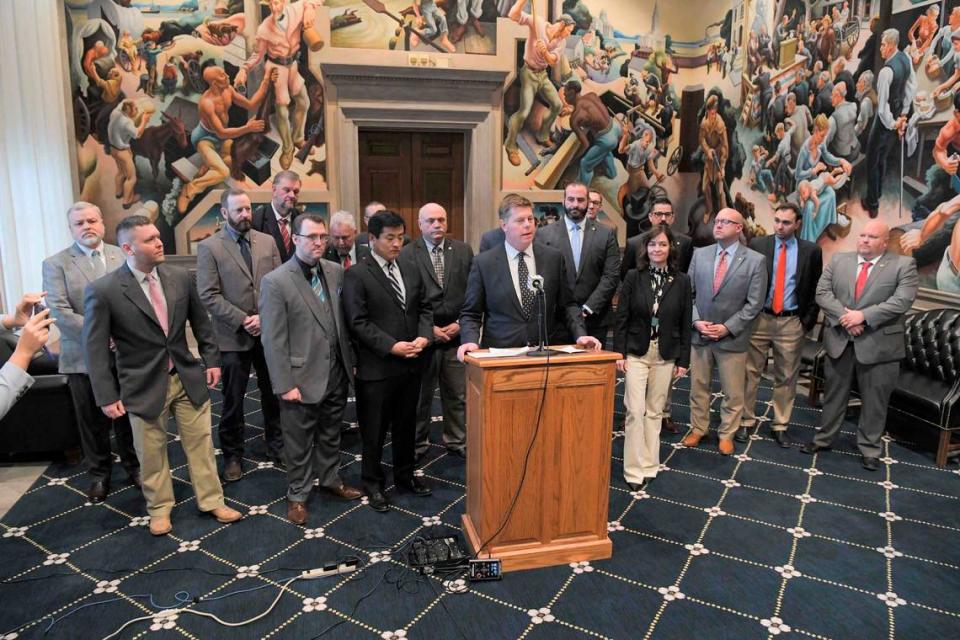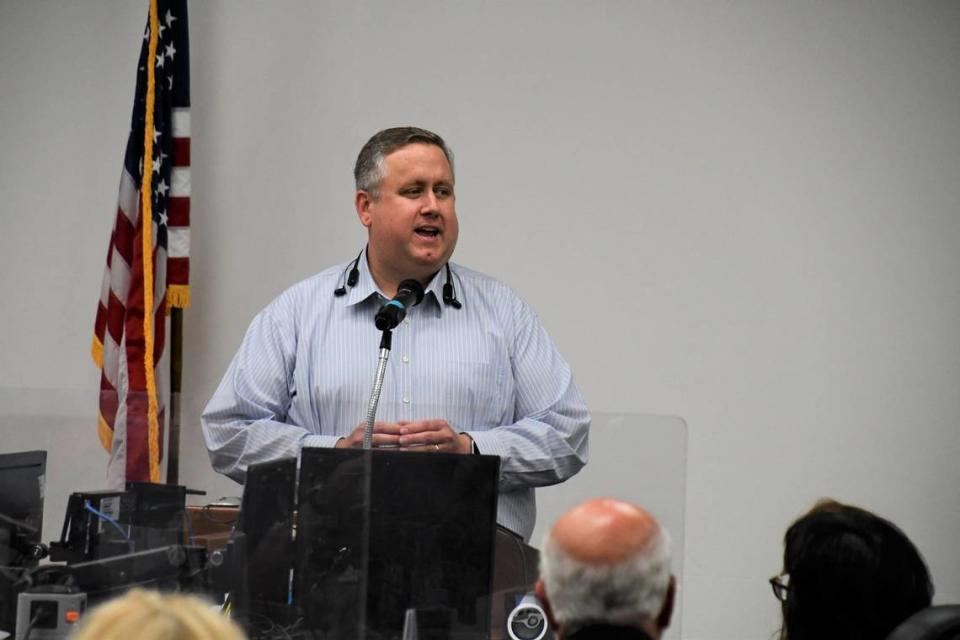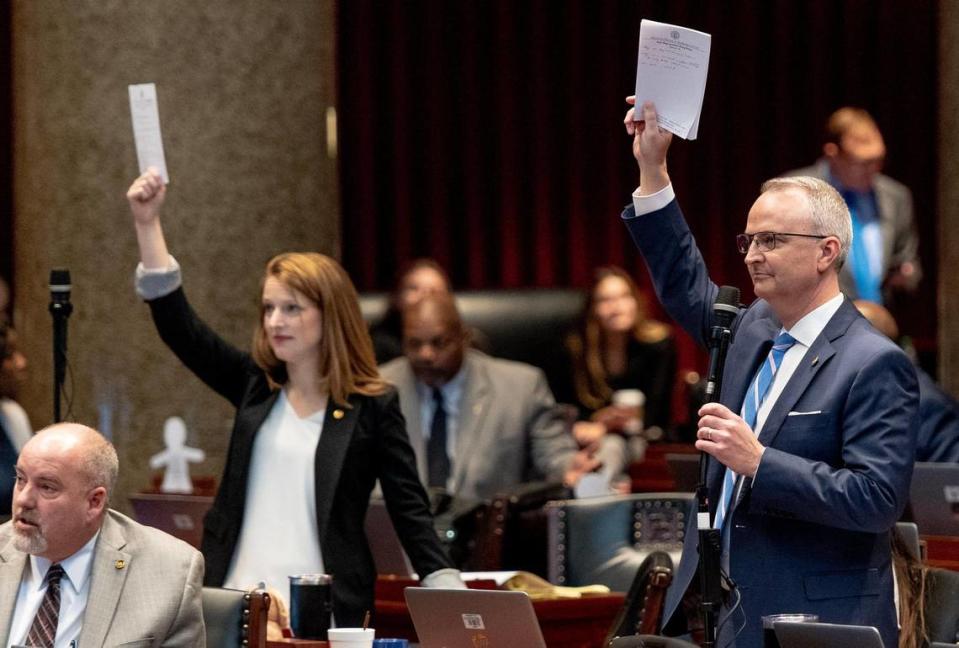MO Republicans’ sweeping plan to ban diversity programs sends agencies into upheaval
A Missouri House plan to bar diversity initiatives through the state budget has sent state agencies into turmoil.
Department heads are now scrambling to figure out how their programs would be affected under the proposed budget’s broad language. They also worry it will prevent them from working with federal agencies and other vendors.
“Our attorneys have told me that it likely would have impact on some of the programs that we’ve been running for many years,” said Robert Knodell, acting director of the Missouri Department of Social Services. “It is very broad language.”
Knodell said his department is creating a list of programs and contracts that could be affected by the budget language. The department assists more than 2 million Missourians through a wide variety of services such as Medicaid, child support payment processing and food assistance programs.
When the Missouri House approved its version of the state’s roughly $50 billion spending plan last week, it added last-second amendments to every state agency’s budget that prohibit state money from paying for staff, vendors, consultants and programs “associated with Diversity, Equity, Inclusion” or “Diversity, Inclusion, Belonging.”
When asked whether the language would affect federal Medicaid funding, Knodell said it was something his department wants to explore further.
“It is definitely something that our attorneys have told us we need to look into more closely,” he said.
The amendments successfully offered by state Rep. Doug Richey, an Excelsior Springs Republican, have sparked anger and confusion among state agencies, Democrats, and even some Republican lawmakers who are sympathetic to efforts to ban diversity initiatives.
Critics say the language Richey added is overly broad and will have far-reaching consequences. They worry it could cause colleges and universities to lose accreditation and they fear the state will lose out on federal funding, including Medicaid.
Others point to numerous companies with diversity initiatives that would be barred from working with the state under Richey’s language. Some lawmakers say Richey has blindsided state agencies to make a political statement as he considers a run for state Senate.
“It’s almost like it’s a stunt,” said state Sen. Mike Cierpiot, a Lee’s Summit Republican. “That’s what drives me crazy…there’s a way to do things properly and there’s a way to do things for Facebook clicks and it looks to me like they’re following that path rather than the proper way of vetting things.”
Cierpiot, who said he supports the idea of banning diversity initiatives, said nobody in the House “vetted anything” before Richey offered his amendments.
The state’s spending plan is now in the hands of the Missouri Senate, where Republican leadership has promised to recraft the language to prevent the state from losing out on funding. But the chamber has been marred by infighting among Republicans in recent years and the budget will likely become a flashpoint between moderates and hard-right conservatives.
Even as lawmakers raise concerns about the financial impact of Richey’s proposal, it comes amid an ongoing push by Republicans nationally to target initiatives designed to attract and retain minority hires.
Senate President Pro Tem Caleb Rowden, a Columbia Republican, said last week that Richey’s amendments “would result in billions of dollars in cuts to hospitals, health care facilities, colleges and universities, and the Missouri House of Representatives itself.”
However, state Sen. Denny Hoskins, a Warrensburg Republican who is typically more aligned with a group of hard-right senators, told The Star in a text message that he doesn’t want the budget language “watered down.”
“I like Rep. Richey’s language and I will continue to work with him and my senate colleagues to have the best anti-DEIB language in the budget as possible,” he said.
If other hard-right senators align with Hoskins to keep Richey’s language intact, it could force Rowden and Republican leadership to draft compromise language to appease both factions.
Richey, in an interview with The Star, said he added the language in response to state and university employees who were concerned about diversity initiatives “that promote collective guilt ideologies.” He said he’s open to clarifying his language to make sure it affects internal department initiatives instead of state contract holders that receive tax credits.
“This has nothing to do with me running for Senate,” he said. “This is just a matter of principle.”
Democratic lawmakers who spoke with The Star said they fear Richey’s proposal will result in numerous cuts to state agencies across the board, even if the full financial impact is not yet known.
State Rep. Keri Ingle, a Lee’s Summit Democrat, said the language would cause the state’s universities to lose accreditation if they have diversity standards. Specific programs and schools within universities, such as law and medical schools, would also lose accreditation if they have similar standards, Ingle said.
The state’s health care system and social services would also be impacted because they are subsidized by federal funds, Ingle said.
“This would affect not only our Medicaid dollars, because there are certain standards that we have in order to obtain those federal matching funds, it would affect our entire health care system,” Ingle said.
Ingle said nearly every liaison from Missouri Gov. Mike Parson’s office has been approaching lawmakers with questions because they did not know the amendments would be proposed. Richey, who serves on the House Budget Committee, did not add the amendments during budget hearings before the budget came to the floor.
Kelli Jones, Parson’s spokesperson, did not respond to an email Monday asking whether the governor felt the language would result in cuts. And Missouri Budget Director Dan Haug declined comment when asked by The Star how the language would affect state agency’s budgets.
State Rep. Peter Merideth, a St. Louis Democrat and ranking minority member on the House Budget Committee, said the language as currently written would also bar the state from working with just about any company.
Any teacher, staff or faculty member associated with a diversity program, even in their private life, could not be hired, he said.
Merideth said he thinks the language will be taken out in the state Senate, but some Republicans may force it back in on the Senate floor.
“I think we’ve learned in the past that we can’t bank on the Senate to rein in the crazy all the time,” he said.




